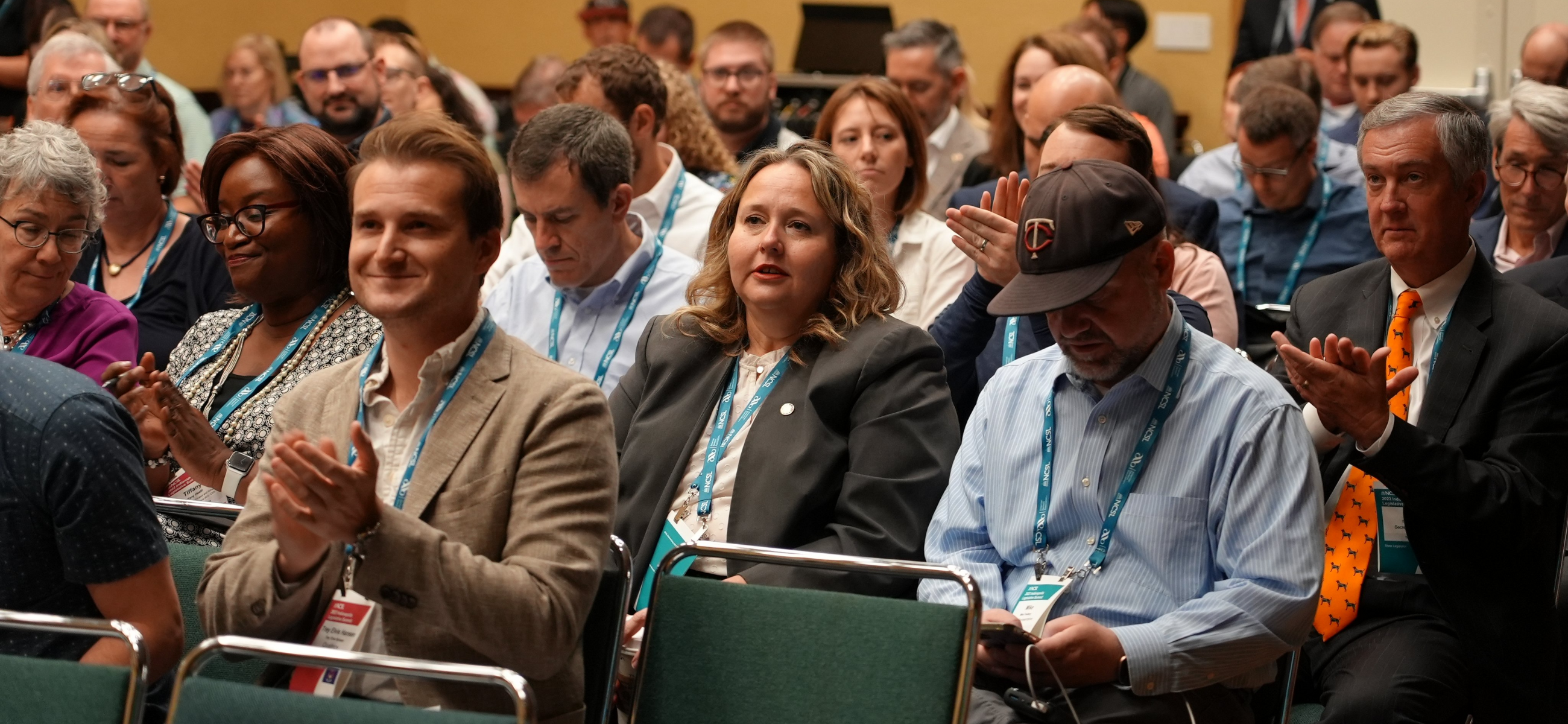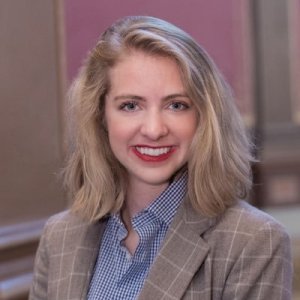Stay ahead of the curve as a political insider with deep policy analysis, daily briefings and policy-shaping tools.
Request a Demo
Partisans from across the political spectrum agree: Elections are vital. Attendees heard from panelists on topics ranging from voter registration list, mail voting, post-election audits and more. (Credit: NCSL)
INDIANAPOLIS — Elections are a cornerstone of American democracy, so it’s crucial for lawmakers to avoid the trap of oversimplification when developing election policy, election experts said.
Elected officials from across the country and around the world are gathering this week at the National Conference of State Legislatures Summit, being held this year in Indianapolis.
During the Monday morning panel “Election Perspectives from Across the Spectrum,” a panel of experts discussed some of the most significant challenges facing elections, including funding, workforce, security and voter list maintenance.
When considering these areas, it’s important for those developing policy to remember elections are complicated and that it’s important to listen to those doing the work of running an election, said Charles Steward, a professor of political science at the Massachusetts Institute of Technology who moderated the discussion.
“Those of us outside of election administration often fall victim to ‘how hard could it be-ism’,” he said. “Running elections is hard.”
The panel included Chad Ennis, vice president of the Honest Elections Project; Liz Howard of the Brennan Center for Justice; Rachel Orey, senior associate and director of elections at the Bipartisan Policy Center, a Washington, D.C.-based think tank; and Matt Germer of the R Street Institute, a center-right think tank.
The panelists agreed that outside funding doesn’t belong in elections.
“Outside funding of election administration — how you run an election — just reeks of potential for impropriety,” Ennis said.
Still, funding for elections is essential, and state governments should look to understand where the gaps in election funding are.
“The ultimate answer can’t be that our voters and our election officials go without,” Orey said.
With that, lawmakers should consider mandatory minimum funding for elections at the state level.
“Elections must be the purview of the states, not the federal government. States must take ownership,” Germer said. “Everyone’s solution to every problem is more money… but this is a vital government function.”
States should consider what role federal funding should play in elections, as those dollars often come with spending requirements. The panelists recommended that states aim to use federal dollars for one-time purchases, such as equipment and technology upgrades.
Another challenge facing elections is the workforce.
There are 10,000 local jurisdictions in the U.S. that run elections, Steward said, and many of them are facing issues with poll worker turnover, recruitment, training compensation and protection.
North Carolina is currently facing a 50% county turnover of election administrators since 2020, and Kansas is facing a 74% turnover, Orey said.
“These are alarming statistics because turnover itself is a risk to the security and integrity of our elections,” she said.
States shouldn’t only ask how they can stop turnover among election workers but also how to make election administration resilient to periods of high turnover, Orey said. That can be done through professional associations and creating a talent pipeline.
“Election officials are the critical infrastructure of our election administration,” she said.
The panelists emphasized the need to invest in election officials and to remember that changes in election policy directly affect the election workforce, so it’s critical to provide adequate resources and time to make those changes happen. Otherwise, election officials are left to face an “unfunded mandate,” Germer said.
Security of elections is another concern for election administrators, both in the security of ballots and of polling locations.
Election officials are tasked with protecting the election process from foreign adversaries and domestic bad actors.
“Three in four election officials say threats against them have increased in recent years,” Howard said.
She recommended officials seek out free resources from the Department of Homeland Security, including security assessments.
Another important factor in election security is guarding against false information.
“That impacts not only the election security piece of this, but also public trust,” Germer said.
Orey encouraged lawmakers to help elected officials by educating themselves, educating voters and being upfront about the bipartisan nature of election administration and their confidence in the system.
“Being the one who’s upfront with voters about your own trust in the system…goes a long way,” she said.
Voter list maintenance is another important factor in election administration, and a significant challenge is keeping data up to date.
“If we want to live in a world where vote-by-mail is available…clean voter rolls is a must,” Germer said.
The panelists discussed ERIC, the Election Information Registration Center, which shares voter registration information across state lines. In recent years, fewer states have used the program because there’s a cost-benefit analysis, and some states are receiving the data, but aren’t using it.
In addition to cleaning voter rolls, Orey recommended online, automatic registration to make voter lists more accurate.
“A little accountability, a little transparency, goes a long way,” Orey said.
Overall, the panelists emphasized providing election officials with the time and funding to make elections run smoothly. Florida, which incorporates preprocessing, early voting and vote-by-mail for efficient election administration was highlighted as a national example.
“Our election officials need resources to take all of these steps,” Howard said.
Elena Durnbaugh is a staff writer for Gongwer Michigan. You can reach her on Twitter @ElenaDurnbaugh.
Header Image: Attendees at NCSL heard from panelists on topics ranging from voter registration list, mail voting, post-election audits and more. (Credit: NCSL)
Professionals still face licensing delays amid state’s transition to online system
The Gist Georgia’s professionals and business owners are still struggling to obtain professional licenses in a timely manner. As the Secretary of State’s Office rolls out its new Georgia Online Application Licensing System to expedite the process, the efficiency of this new process is being put to the test. What’s Happening Thursday morning at the …
Controversy over AP African American Studies class grows
Rashad Brown has been teaching Advanced Placement African American Studies at Atlanta’s Maynard Jackson High School for three years. He’ll continue to do so — even though the state’s top education official removed it from the list of state-funded course offerings for the upcoming school year. While Brown prepares to start teaching his class on …
Students, teachers, lawmakers blast decision to end AP African American history classes
ATLANTA — A coalition of lawmakers, civil rights leaders, clergy, educators and students Wednesday called on the state’s education czar to rescind his decision to drop an advanced placement African American studies class from the state’s curriculum for the upcoming school year. “This decision is the latest attack in a long-running GOP assault on Georgia’s …
Kamala Harris’ presidential bid reinvigorates Georgia Democrats
Georgia Democrats have gained new momentum heading into the November election, propelled by President Joe Biden’s decision to bow out of his reelection bid and hand the reins to Vice President Kamala Harris. The historic decision, announced Sunday, is expected to prove pivotal in the national and state political arenas and breathe new life and …




